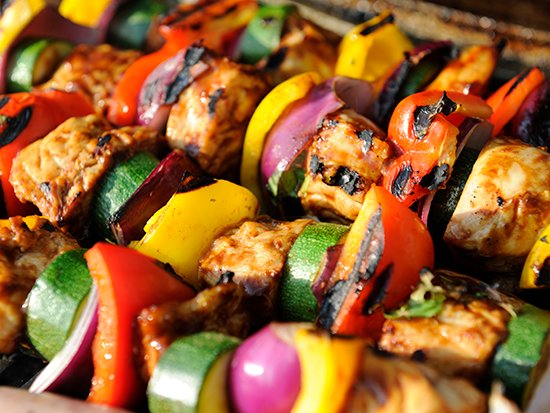Football season is here, and it is time to bring out the tailgating recipes. Fortunately, there are many ways football fans can put a heart-healthy twist on their tailgates this year. Experts from …
This item is available in full to subscribers.
Please log in to continue |

Football season is here, and it is time to bring out the tailgating recipes. Fortunately, there are many ways football fans can put a heart-healthy twist on their tailgates this year. Experts from the University of Alabama at Birmingham are sharing tips for how to make this tailgate season a heart-healthy and delicious experience.
Manage portion sizes
Research shows that people unintentionally consume more calories when faced with larger portions. This can lead to a significant excess calorie intake, especially when eating high-calorie foods. Downsizing portions of proteins and other foods is the first step toward a healthier meal.
"When it comes to portion control and planning for a tailgate with a full menu, it is never a good idea to skip meals to save up calories," said Elizabeth Jackson, M.D., professor in the UAB Division of Cardiovascular Disease. "Not eating the morning of a tailgate can make you hungrier and cause you to overeat. Eating a healthy snack before the tailgate may help you eat smaller portions while watching the game."
Genetics, body type and lifestyle play a major part in the amounts and types of nutrients each person should eat. For most adults, 4-6 ounces of protein is a healthy portion, and adding grilled vegetables, green sides and salads to the menu can make getting full easy.
Select low-fat proteins
Lean meat, poultry and fish are some of the best sources of protein. Choose lower-fat options such as lean/extra lean beef patties, turkey, or skinless chicken breasts or strips. Fish is a good alternative to high-fat meats.
"Choose options that are rich in omega-3 fatty acids, such as salmon burgers," Jackson said.
According to the American Heart Association, regularly eating fish and seafood is consistently associated with lower risk for cardiovascular disease. Fatty fish such as anchovies, herring, mackerel, black cod, salmon, sardines, bluefin tuna, whitefish, striped bass and cobia are a good source of omega-3 fatty acids, which can reduce the risk of heart disease and stroke.
Pile on the plants
It is recommended that everyone fill at least half of their plate with veggies and other plant-based foods such as legumes — black beans, chickpeas or lentils. This will boost their fiber intake and keep them feeling full throughout the game.
"Instead of using chips and nachos with some of your favorite dips, use veggies such as celery sticks, cauliflower, broccoli, carrots and sweet potatoes," said Efstathia Andrikopoulou, M.D., assistant professor in the Division of Cardiovascular Disease.
"This is an easy way to load up on veggies while still enjoying some classic tailgate recipes."
Choose whole grains
Whole grains are good sources of fiber and other nutrients that play a role in regulating blood pressure and heart health.
"Choose whole wheat options for your sliced bread, hamburger buns and hot dog buns," Andrikopoulou said. "If you want to limit the amount of carbs or bread you consume, replace buns with lettuce wraps."
Reduce salt
Eating too much salt can lead to high blood pressure, a risk factor for heart disease. Limiting salt is an important part of a heart-healthy diet.
Andrikopoulou recommends choosing reduced-sodium versions of condiments and dressings or using more pepper, garlic, onion, paprika or oregano, instead of salt.
Cut back on unhealthy fats
Saturated fats are fats typically found in food and beverages people consume. Most come from animal products, like dairy, meat and poultry. Eating too many foods high in saturated fats can be very unhealthy and may cause heart disease. Fortunately, football fans can easily lighten up some of their signature dishes with some smart substitutions.
"Try to cut back on unhealthy fats by using less butter and oils when cooking," Jackson said. "Instead of using pre-made marinades, make your own. I would also recommend trying low-fat substitutions, when possible, such as topping a baked potato with low-sodium salsa or low-fat yogurt instead of butter."
Another easy way to cut back on unhealthy fats is by baking, broiling or grilling meats instead of frying them.
Choose drinks wisely
Alcoholic beverages are usually plentiful at football tailgates; but when it comes to these beverages, Andrikopoulou says moderation is key.
"It is best not to overindulge in alcoholic beverages," Andrikopoulou said. "If you want to drink at the game or tailgate, try to choose a beverage with the least number of calories and carbohydrates."
For those who choose to drink alcohol, the American Heart Association recommends limiting to an average of one to two alcoholic drinks per day for men and one drink per day for women. They define a drink as one 12-ounce beer, 4 ounces of wine, 1.5 ounces of 80-proof spirits or 1 ounce of 100-proof spirits.
When it comes to soda, Andrikopoulou recommends sticking to low-calorie and zero-calorie soda; but she says the best option is always water.
"By drinking more water, you will avoid dehydration and get full faster, which can help you limit the number of drinks you consume," Andrikopoulou said. For those who do not like plain water, drinking fruit-infused water, flavored water, water with flavoring additives and sparkling water is a way to stay hydrated.
By following these tips, football fans can keep their tailgating and other parties heart-healthy without giving up the fun or the flavor. Browse our collection of heart-healthy tailgate recipes at https:/www.uabmedicine.org.